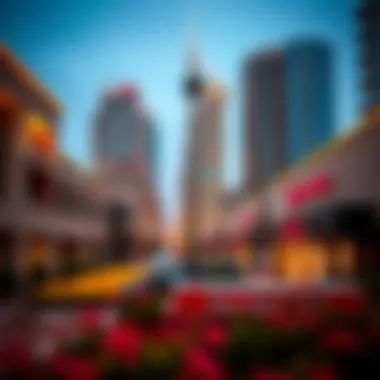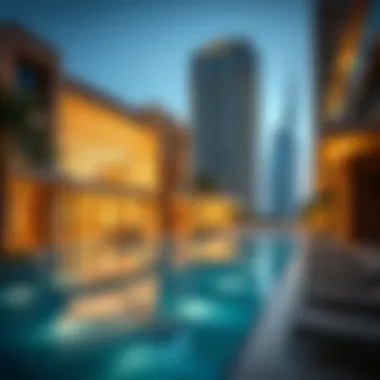Living Conditions in Dubai: An In-Depth Exploration


Intro
Dubai, the dazzling jewel of the UAE, is often envisioned as a realm of luxury, innovation, and diversity. But beneath the glittering surface lies a complex landscape that shapes the living conditions for its residents. This city attracts a myriad of individuals ranging from expats seeking new opportunities to investors eyeing high-return real estate ventures.
Understanding the intricacies of living in Dubai extends beyond the skyscrapers and extravagant shopping malls. It encompasses various factors such as housing options, the cost of living, cultural dynamics, and urban infrastructure. Each aspect plays a pivotal role in the daily lives of its inhabitants.
Here, we will explore these facets in depth to equip potential residents and investors with the necessary knowledge to navigate this vibrant metropolis. From the bustling neighborhoods to the serene suburbs, the landscape of living in Dubai is as varied as its population. Recognizing the current market trends can also illuminate the potential advantages and challenges faced by those contemplating a move or investment in this city where tradition meets modernity.
Prologue to Living Conditions in Dubai
Understanding the living conditions in Dubai is crucial for anyone looking to relocate, invest, or work within this bustling city. The significance of this topic cannot be overstated as it encompasses various aspects that directly impact everyday life, from housing options to cultural integration. Dubai is not merely a city; it's a melting pot where tradition meets modernity, often beckoning expatriates and investors alike to explore its dynamic opportunities.
When considering a move to Dubai, it’s essential to grasp the unique blend of lifestyles available. For expatriates, the choice of residence, whether it be in a high-rise apartment in the heart of Downtown or a villa along the coast, shapes their overall experience in the city. Owning property versus renting also involves understanding the market trends and legal obligations, making an informed choice pivotal to settling down seamlessly.
Moreover, the cost of living plays a fundamental role in determining one's quality of life. Insights into housing expenses, daily necessities, transportation fees, and healthcare availability provide a pragmatic framework for prospective residents. The financial implications of life in Dubai, especially comparing them with other global cities, are vital for making sound decisions.
Beyond the financial aspects lies the fabric of Dubai's diverse society. The flourishing expatriate community and the rich tapestry of local culture offer a unique social dynamic that one cannot find in every corner of the globe. Engaging with community events and cultural institutions enriches the living experience, promoting social integration in a city known for its rapid growth and change.
In summary, the living conditions in Dubai present a complex and layered narrative that is critical for anyone pondering a significant life change. This article seeks to unveil these layers, presenting a thorough exploration of housing options, cost of living, cultural and social dynamics, alongside the essential infrastructure that supports daily life. Whether you're an investor, a homeowner, or a renter, understanding these conditions lays the groundwork for a successful and fulfilling experience in one of the world's most vibrant cities.
Housing Options
Housing options in Dubai are crucial because they shape the living experience for residents. This city offers a variety of residential choices suitable for different lifestyles and budgets. By understanding the available types of residences, potential residents can make informed decisions tailored to their needs.
Types of Residences
Apartments
Apartments are perhaps the most prevalent form of accommodation in Dubai. They come in various sizes and layouts, catering to individuals, couples, and families alike. One of the key characteristics of apartments is the flexibility they offer. Generally, they are more affordable compared to other types of housing, making them a popular choice among expatriates, especially newcomers without large investments. A unique feature of apartments in Dubai is the availability of amenities such as gyms, pools, and concierge services, which enhance the quality of life. On the downside, residents might feel the pinch of space, especially in smaller units, and the noise from neighboring apartments can sometimes be a nuisance.
Villas and Townhouses
Villas and townhouses offer a different slice of Dubai living. Known for their spacious designs, these homes provide residents with private outdoor areas and often come with gardens. A notable advantage of villas is the sense of community they can foster, as many are located in gated communities with shared facilities. This makes them appealing to families looking for a safe and engaging environment. However, one painful point can be the higher maintenance costs and potential for significant utility bills, considering their size.
Luxury Properties
Luxury properties in Dubai are synonymous with opulence. They attract affluent individuals seeking high-end living experiences. These residences often feature architectural marvels with lavish interiors, private pools, and premium locations, like the Palm Jumeirah. The exclusivity and aesthetic appeal are major draws for buyers and renters alike. However, the price tags attached can be staggering; such properties are only feasible for a select few. Additionally, the upkeep of these lavish facilities can be demanding, both financially and in maintaining the lifestyle that comes with them.
Shared Accommodations
Shared accommodations have gained traction in recent years, especially among young professionals and students. This option not only reduces rental costs but also promotes social interaction, providing a ready-made support system, conducive to forging friendships. The key characteristic of shared living spaces is the communal lifestyle, where individuals share common areas like kitchens and living rooms. However, while this arrangement can be economical, it may also lead to conflicts over household responsibilities or the sharing of space.
Rental vs. Ownership
The choice between renting and owning property in Dubai is another pivotal aspect of housing options. It impacts not just financial decisions, but also lifestyle and long-term plans. Both paths have their own merits and potential pitfalls, hence a discerning understanding is essential.
Market Trends
Currently, market trends in Dubai's real estate indicate a fluctuating landscape. The rapid development and influx of expatriates drive demand, making real estate a dynamic sector. It’s essential for potential buyers and renters to stay updated with market reports as they can inform decisions. Prices may fluctuate due to factors such as economic conditions and population growth. Keeping an eye on these trends can work in favor of investors looking for opportunities to capitalize.
Buying Procedures
When it comes to buying property, the procedures can be quite intricate. Buyers must effectively navigate through a series of steps that include securing a mortgage if necessary, understanding the legal requirements, and dealing with paperwork. A distinctive aspect is that foreign buyers can own properties in designated areas, which opens possibilities for investment. However, the extensive documentation and potential hidden costs might discourage some prospective homeowners.
Rental Agreements
Rental agreements in Dubai are often well-structured and cater to the secure residential experience that tenants seek. The agreements usually outline all terms clearly, including length of lease, rent payment details, and responsibilities regarding maintenance. A key element here is that landlords cannot suddenly increase the rent outside the bounds set by the regulatory authority, offering some peace of mind to renters. Nevertheless, tenants face challenges like adhering to strict regulations and the potential of losing their deposit if not careful.
Cost of Living Analysis
Analyzing the cost of living in Dubai is pivotal, particularly for expatriates and investors aiming to make informed decisions. This exploration helps individuals understand what to expect in terms of monthly expenses and lifestyle choices. By dissecting housing, daily expenses, and other essential elements, one can gauge the overall affordability and desirability of living in this vibrant city.
Housing Expenses
Average Rent Prices
Average rent prices in Dubai can swing widely based on location and property type. For instance, if someone were looking at a one-bedroom apartment in Jumeirah Beach Residence versus one in Deira, they’d notice remarkable differences. The former could easily cost around AED 10,000 per month, while the latter might be closer to AED 6,000. It's essential to analyze these price variances as they significantly shape one’s budget and lifestyle.
High demand in posh areas means higher rents, but for many, the benefits of living near work or entertainment outweigh the costs. Despite the potential sticker shock, the rental market is often competitive, providing flexibility in agreements and options like furnished vs. unfurnished.
"Renting in Dubai often feels like fishing in a vast sea—plentiful options but also plenty of surprises lurking beneath the surface."
Utilities and Maintenance
When it comes to utilities and maintenance, being aware of these additional costs is crucial for anyone considering relocation. Utilities in Dubai—covering electricity, water, and cooling—could set residents back anywhere from AED 500 to AED 1,200 monthly, depending on usage. Maintenance costs enjoy a notable variance too, often dictated by the age and condition of the property.
Many landlords include maintenance in rental agreements, creating extra buffer against unexpected expenses. Nevertheless, new arrivals need to snapshot the potential financial commitment that comes with utility costs, which can steeply bump up their budget.
Daily Expenses Overview
Food and Groceries


Food and groceries in Dubai can fit a vast range of budgets. Dining out in a modest restaurant would set you back around AED 50 per meal, while high-end eateries might charge AED 300 or more. Grocery shopping also showcases diversity; local markets can provide fresh produce at reasonable prices, compared to upscale supermarkets that may charge a premium.
Understanding where to shop becomes paramount. Expatriates often opt for places like Carrefour or Spinneys, known for their variety, but traditional souks can present both uniqueness and savings. This aspect of living in Dubai adds to the rich tapestry of choices that residents can enjoy while staying within their financial limits.
Transportation Costs
Transportation costs in Dubai are fairly affordable, especially when weighing public options against owning a car. With the Metro running efficiently and taxis readily available, individuals might spend around AED 300 to AED 600 monthly, depending on usage.
Investing in a Nol card for public transport purposes can lead to additional savings, especially for those commuting regularly. However, owning a car could increase costs, including insurance and parking fees sprinkled in the mix. When considering the various means of getting around, understanding the implications of these expenses is vital to financial planning.
Healthcare Services
Healthcare services in Dubai rank impressively amongst global standards. Public healthcare is accessible at nominal fees or even free for residents, which is a strong consideration for expats. Private healthcare does come at a cost, with consultation fees ranging between AED 300 and AED 800, depending on specialists.
Also, the availability of health insurance is crucial. Many employers offer health coverage, but for those needing additional policies, understanding what's included and what's not can greatly impact monthly expenditures. With a robust healthcare system, residents can generally feel secure knowing they have access to quality medical services.
Cultural and Social Dynamics
Cultural and social dynamics in Dubai are crucial because they shape the experiences, interactions, and lifestyles of both locals and expatriates. The city is a bustling melting pot, where various cultures converge and coexist. Understanding these dynamics is vital for anyone looking to thrive in Dubai, as they influence everything from daily interactions to larger community engagements. Additionally, recognizing the role of cultural nuances and social behaviors can lead to better integration into the fabric of the city.
Diverse Population
Expat Community
The expat community in Dubai is vast and lively, comprising over 80% of the population. Many come seeking work opportunities, drawn by the city's booming economy and tax-free income. A striking characteristic of this community is its diversity; people from various countries bring their customs, languages, and traditions, enriching the local culture.
This vibrant mix can be a real boon for expats. It cultivates an environment where individuals feel at home while exploring flavors of many cultures. However, this can also lead to challenges, such as cultural misunderstandings or feelings of isolation for those who do not engage with locals or other expatriates. Being part of an extensive network can help, but it's essential to connect with the community to truly leverage the advantages of living in a diverse city like Dubai.
Local Culture
The local culture in Dubai is rooted in Arabic traditions and Islamic values, which profoundly influence daily life. One key characteristic is the importance placed on hospitality and family. Festivals like Eid al-Fitr and Ramadan highlight this aspect, where gatherings are common and communal eating occurs. This rich cultural fabric is fascinating for newcomers and offers a window into the local way of life.
Embracing local customs presents an opportunity for expatriates to bond with their neighbors and participate in community events. Conversely, ignoring these traditions can lead to unintentional offense. Understanding and respecting local culture can facilitate smoother social integration, fostering mutual respect and recognition among different groups.
Social Integration
Community Events
Community events in Dubai are a cornerstone of social integration. They provide a platform for expatriates and locals to interact, learn about each other's backgrounds, and celebrate diverse cultures. From festivals celebrating national holidays to food fairs and sporting events, involvement is a cornerstone for building relationships.
These events are appealing, bringing people together in a more relaxed setting, fostering informal connections that lead to lasting friendships. However, the level of involvement varies; newcomers may find it daunting to participate in larger gatherings initially. Still, over time, they can find their place within the community, showcasing the strength of social networks.
Cultural Institutions
Cultural institutions in Dubai, like art galleries, museums, and theaters, are vital in preserving and sharing the city’s rich history and vibrant present. These establishments promote understanding between cultures by providing spaces for education, discussion, and artistic expression. The Dubai Museum, for instance, offers insights into the emirate's past and transformation into a metropolis.
Engaging with these institutions benefits both expatriates and locals. They can broaden their horizons, fostering appreciation for the arts while creating venues for workshops and exhibitions that highlight various cultural narratives. This sharing of knowledge can bridge gaps, while also presenting challenges in how effectively institutions adapt to the needs of a diverse audience.
Urban Infrastructure
Urban infrastructure serves as the backbone of any city's functionality, linking its residents to essential services, transportation, and leisure activities. In Dubai, the impressive urban infrastructure is a significant aspect of the living experience, impacting both expats and investors. With a rapidly growing population, the demand for a well-planned infrastructure has never been more critical. The government’s commitment to developing robust roads and public transport ensures residents can navigate the city with ease and convenience. Moreover, a strong infrastructure not only supports daily activities but also enhances the overall quality of life.
Transportation Systems
Public Transport Options
Dubai’s public transport options are an essential consideration for anyone moving to the city. The network includes the Dubai Metro, buses, and trams that crisscross the metropolis efficiently. One noteworthy feature of the Dubai Metro is its driverless operation, adding a touch of modernity to urban travel. The Metro is not only one of the cleanest public transport systems globally, but it also integrates seamlessly with bus and water transport systems, allowing for smooth transfers.
Public transport is popular due to its cost-effectiveness and convenience, especially for those who do not own a vehicle. The fare system is straightforward, giving passengers the freedom to use a Nol card for easy access across multiple modes of transport, which saves time and minimizes hassle.
However, during peak hours, the trains can be quite crowded, leading to potential discomfort for commuters. Still, the benefits of swift travel times and the extensive coverage often outweigh these downsides.
Road Infrastructure
The road infrastructure in Dubai is equally impressive, featuring a network of well-maintained highways that connect all corners of the city. Roads like Sheikh Zayed Road are iconic and offer spectacular views, further attracting residents and tourists alike. The city is designed for ease of movement, with clear signage and multiple lanes that help reduce congestion.
This framework enables smooth traffic flow and is vital for the logistics of businesses, making it a beneficial element for investors and commercial activities. Moreover, initiatives such as smart traffic lights and integrated toll systems significantly improve travel efficiency.
On the flip side, heavy traffic can still pose a challenge, particularly during rush hours when many people commute to work. Yet, the combination of efficient road design and public transport works to ensure management of the traffic flow.
Recreational Facilities
Parks and Leisure Areas
Dubai boasts a variety of parks and leisure areas that contribute significantly to the quality of life for its residents. These green spaces provide much-needed relief from the bustling city life, allowing individuals and families to unwind amidst nature. One striking example is the Al Barsha Pond Park, offering recreational activities such as walking, biking, and picnic areas.
These parks are integral for community bonding. They promote healthy lifestyles and often host events that engage locals and expatriates alike. The availability of such leisure spaces is a critical factor for families considering relocation, as they enhance the overall living experience.
However, some parks can become quite crowded, especially on weekends, which may detract from the peaceful atmosphere. Nonetheless, the city continues to expand and develop more recreational facilities, making it a tempting choice for newcomers.
Sports Complexes


Sports complexes play a pivotal role in fostering a culture of fitness and community interaction in Dubai. Facilities like the Dubai Sports City comprise state-of-the-art arenas and training centers, attracting athletes and sports enthusiasts from various backgrounds. They provide venues for both serious training and casual play, making them a popular choice for residents.
Access to high-quality sports complexes is especially appealing to expatriates who wish to maintain an active lifestyle. These facilities often offer a range of programs, catering to different skill levels and interests, which encourages participation across the societal spectrum.
The downside might be associated costs, as some complexes require membership fees. However, the investment is typically seen as worthwhile due to the diversity of options available.
As a whole, Dubai's urban infrastructure, including transportation systems and recreational facilities, plays a fundamental role in shaping the living conditions for residents. The well-planned layout, coupled with modern amenities, significantly enhances the appeal of this vibrant city, attracting a mix of cultures and lifestyles.
Education and Healthcare Services
The living conditions in Dubai are deeply intertwined with two significant aspects: education and healthcare services. Both serve as pillars that support not just the well-being of individuals but also the overall growth and development of the community. For expatriates considering a move to the emirate or investors eyeing opportunities in the real estate sector, understanding the educational landscape and healthcare provisions is paramount.
Educational Institutions
International Schools
International schools coming to the fore has become a trademark of Dubai’s educational system. They cater to a diverse range of expatriate communities, representing various countries and educational curricula. This multicultural aspect is one of their key characteristics, offering a learning environment enriched by different cultures and languages.
One of the main considerations for parents is the curriculum options available. Many of these schools offer programs like the British, American, or International Baccalaureate, which prepares students for global challenges. This makes international schools a popular and beneficial choice since they help children adapt quickly to any future educational setup around the world.
However, the disadvantages cannot be overlooked. The tuition fees for these institutions can be steep, often reaching levels that might stretch the budgets of middle-class expatriates. Homes in close proximity to these schools, therefore, tend to be in higher demand and ultimately hike up housing costs in those areas.
Universities and Colleges
Moving to higher education, Dubai boasts a range of universities and colleges that contribute significantly to its reputation as an educational hub in the Middle East. Many of these institutions are branch campuses of reputable global universities, which enrich the local academic environment and provide students with internationally recognized degrees.
One major advantage of attending these universities is their strong industry connections. Programs often include internships and collaborations with local businesses, giving students a head start in their careers and aligning education more closely with real-world applications. This aspect makes universities in Dubai a smart choice for aspiring professionals looking to establish a career.
However, there are also challenges. The competitive nature of these institutions can put pressure on students, and while most programs are globally recognized, some may argue that local institutions may not have the same prestige as their parent campuses abroad.
Healthcare Availability
Public Healthcare Facilities
In Dubai, public healthcare facilities form a backbone of the general health services available to residents. Funded by the government, these facilities are designed to provide affordable health care to all UAE citizens and residents, making them an integral part of the social structure. The main characteristic here is accessibility; with numerous hospitals and clinics spread across the emirate, residents can readily obtain medical help.
One of the key benefits of using public healthcare is affordability. Many services are either free or offered at a substantially reduced cost compared to private medical care. This makes public facilities a popular choice among lower-income expatriates. However, long waiting times and crowded facilities can be a notable disadvantage of the public system, leading many to consider private alternatives.
Private Healthcare Providers
On the other end of the spectrum, private healthcare providers in Dubai are known for their high standards and advanced medical technology. They offer a broader array of specialized services compared to public facilities. The upscale nature of these private institutions often attracts those who can afford it, making them a preferable option for expatriates with comprehensive health insurance.
The standout trait of private providers is the quality of care. Patients often receive more personalized attention, faster service, and access to specialists quicker than in public settings. However, the flipside is that the costs can be insurmountable for many, particularly if significant treatments are required. This creates a disparity in healthcare access depending on one’s financial capacity.
Understanding the balance between public and private healthcare is fundamental for anyone planning to settle in Dubai, as it has profound implications on quality of life.
In summary, the education and healthcare services in Dubai play a crucial role in shaping the living conditions of its inhabitants. Awareness of these aspects enables potential newcomers to make informed decisions, whether it’s securing educational opportunities for their children or accessing health services tailored to their needs.
Regulatory Environment
Understanding the regulatory environment in Dubai is crucial for anyone looking to establish themselves in the city, whether it's for work, residency, or investment purposes. The legal framework establishes how residents and foreigners can live, work, and invest within the emirate. This section breakdowns the complexities of the regulatory scene, focusing on residency and work permits, as well as property ownership laws, which are vital for ensuring that both expatriates and investors maneuver through Dubai's landscape smoothly.
Residency and Work Permits
Visa Categories
In Dubai, various visa categories facilitate expatriates' ability to live and work. The work visa is particularly significant, allowing foreigners to legally reside while contributing to the dynamic economy of the emirate. A defining characteristic of these work visas is that they are often tied to employment contracts. This feature can be both advantageous and a bit restrictive, as securing a job is often a prerequisite for obtaining a visa.
Moreover, there are different types of residence visas, such as investor, family, and student visas, each tailored for specific needs. The expatriates find the investor visa appealing due to the opportunity it represents, allowing them to not only live in Dubai but also engage in business activities, thereby strengthening their ties to the economy. Just like a double-edged sword, the requirements to get these visas can sometimes be a roadblock, requiring thorough documentation and a clear proof of financial stability.
Application Procedures
The application procedures for residency and work permits in Dubai are another layer of complexity. The primary process begins with a job offer, from there, the employer takes charge of applying for the work visa on behalf of the employee. It’s a structured approach but can be cumbersome due to the multitude of documents required: medical tests, passport copies, employment contracts, to mention just a few.
Vincent, a software engineer from France, recalled his experience long after he had settled. "I had to get a health check done, which felt like jumping through hoops! But it was worth it to start my new life in Dubai," he shared. This layering of requirements can make the application feel like a Moscow circus; overwhelming yet necessary for those eager to begin their journey in this vibrant city.
Legal Framework for Property Ownership
Foreign Ownership Laws
The foreign ownership laws in Dubai are designed to encourage investment while offering specific regions where foreigners can own property outright. This law is a double-edged sword; on one hand, it allows for enticing opportunities for investors who wish to stake their claim in Dubai’s lucrative real estate market.
A unique feature worth noting is the allowance for 100% foreign ownership in designated freehold areas. However, this comes with certain caveats, such as needing legal advice to navigate complex regulations and ensuring compliance with property ownership laws. Though the potential gains are high, the risk of falling afoul of regulations can make the landscape quite perilous for unseasoned investors.
Regulatory Authorities
Understanding the role of regulatory authorities can greatly enhance one's ease in navigating Dubai's real estate sector. Authorities like the Dubai Land Department oversee property transactions and enforce laws governing ownership. This framework is built to protect investor interests and streamline processes.
The notable characteristic here is the transparency that Dubai aims to foster through these bodies. Nevertheless, some may find the bureaucratic aspect tedious; forms to be filled out, approval waiting times, and the accompanying costs can be a few bumps in the road. However, a well-informed investor can pave a smoother path, significantly reducing the headaches often associated with buying property.
"Having clear guidelines from the regulatory authorities made my investment in Dubai far more secure than I had anticipated," shared Ravi, an Indian investor who recently secured a property in Dubai Marina.


By understanding these regulations, expatriates and investors can better prepare themselves to face the challenges of living in Dubai. Familiarity with the legal framework ensures that both groups can make informed decisions, ultimately leading to a successful engagement with this bustling city.
Quality of Life Metrics
Understanding the Quality of Life Metrics in Dubai is essential for anyone contemplating a move to the city. These metrics encapsulate a range of factors that contribute to the overall living experience, affecting both expatriates and local residents alike. When analyzing quality of life, considerations such as safety, health care, environmental factors, and recreation come into play. High-quality living standards tend to attract more people, including investors and expatriates seeking a lifestyle that balances work and leisure. For many, these metrics serve not just as indicators but as vital components for deciding to relocate, invest, or settle down in this vibrant metropolis.
Safety and Security
Crime Rates
Dubai's crime rates are remarkably low compared to many global cities. With a strong police presence and stringent law enforcement, the city is often regarded as one of the safest urban environments in the world. According to government statistics, violent crime is extremely rare, making this a favorable aspect for potential residents.
What stands out about these crime rates is the transparency of the reporting system. The local government publishes statistics frequently, fostering trust and keeping residents informed. This unique feature enhances the overall sense of security among its inhabitants. However, it’s crucial to remain vigilant in any urban space. While crime is low, petty crimes such as pickpocketing can happen in busy markets, reminding newcomers to exercise common sense.
Emergency Services
Dubai's emergency services are highly advanced and efficiently organized. The city's infrastructure ensures rapid response times, which is critical in emergencies. Police, fire, and ambulance services are all integrated in a way that optimizes support during critical situations.
Another key characteristic of these emergency services is their continual improvement driven by technology. Their integration with modern tech means residents benefit from timely updates and alerts in various languages, catering to the diverse population. While the emergency response is often commendable, like any system, it does come with its challenges, such as occasionally high-demand during major events that might overwhelm units temporarily.
Environmental Considerations
Air Quality
Air quality in Dubai is a complex issue. On one hand, the city has various regulations in place to monitor and improve air conditions, particularly those issued by the Ministry of Climate Change and Environment. Measurements show considerable efforts to reduce pollutants from construction, traffic, and industrial zones, making strides toward cleaner air.
However, the unique geographic location and climatic conditions can result in fluctuating air quality levels, especially during sandstorm seasons. Residents may notice higher particulate matter levels during these times, which can impact health, particularly for those with respiratory issues. Investors and homeowners often look for properties with good air quality standards, considering these environmental factors essential when evaluating living conditions.
Urban Green Spaces
Dubai's approach to urban green spaces is a notable element contributing to quality of life. The city has invested in parks and recreational areas such as Zabeel Park and the Dubai Marina Walk, offering residents lush environments to unwind amidst the urban hustle. Such green areas provide not only aesthetic value but also improve air quality and environmental balance.
One striking feature is the initiative to create more vertical gardens and community parks integrated alongside residential complexes. This innovative approach helps in maximizing green areas within the urban fabric. However, challenging climatic conditions limit the amount of greenery that can be sustained year-round, making maintenance and management a crucial discussion among city planners and community leaders.
"The balance of urban development and green spaces is a pursuit that shapes the lifestyle of Dubai’s residents."
In summary, the Quality of Life Metrics in Dubai, encompassing safety, emergency services, air quality, and urban green spaces, play a pivotal role in the overall living experience. Investors and expatriates must consider each of these factors when making a decision about life in this thriving city. As Dubai develops, continual investment in these metrics will likely enhance the living conditions for all.
Comparative Analysis with Other Cities
When exploring living conditions in Dubai, it's crucial to understand how they stack up against other urban environments. A comparative analysis offers insights that can significantly influence potential residents and investors. The goal is to highlight the unique features and challenges specific to Dubai, enabling informed decisions about moving or investing.
Living Standards in the Region
Middle Eastern Comparisons
Dubai is often viewed as a beacon in the Middle East. Its modern skyline, bustling economy, and high-quality infrastructure set it apart from other cities in the region. Compared to Riyadh, with its conservative lifestyle and limited recreational options, Dubai stands as a more appealing choice for expatriates. The cultural diversity and vibrant expatriate community in Dubai give it a unique charm.
However, it’s not all roses. Cities like Doha and Abu Dhabi also offer competitive living standards but with less volatility in housing prices. For those considering Middle Eastern cities, it's essential to weigh factors like job opportunities, educational institutions, and social life.
"Dubai is a global city that might be the Arab world’s most liberal and diverse environment given its growing cosmopolitan population."
Global Urban Centers
In the broader context of global urban centers, Dubai shines brightly, yet it faces stiff competition. Cities such as Singapore and London have longstanding reputations for business and leisure. What makes Dubai attractive is its strategic geographical location, serving as a bridge between the East and West, and its bustling free-trade zones. Economic incentives are robust, drawing in expats eager to benefit from tax exemptions and entrepreneurial opportunities.
That said, some aspects can be challenging. Costly housing and inflation can sour the experience. For those wanting a cosmopolitan lifestyle without the London price tag, Dubai presents an interesting balance, offering modern amenities while still being viewed as a relatively affordable option when placed alongside cities like New York.
Cost of Living Comparison
Comparing Major Cities
When comparing the cost of living among major cities, Dubai frequently emerges as a favorable contender. In terms of housing and transportation, costs tend to be lower than those in major Western cities. For instance, renting a one-bedroom apartment in the city center often costs less than in Manhattan.
However, it’s important to consider the nuances. While groceries and some services might be cheaper, luxury goods can come with a hefty price. Thus, it’s essential to look at overall budgeting as opposed to singular metrics. Expatriates usually find Dubai a flexible option that allows for a high quality of life without scrimping too much on creature comforts.
Value for Money Analysis
The value for money in Dubai is a double-edged sword. On one hand, the influx of modern amenities and infrastructural investments provides significant advantages. Brand-new schools, state-of-the-art healthcare facilities, and luxurious shopping centers are commonplace.
Yet the cost associated with these perks can be high. The utilities and lifestyle expenses can mount up quickly, particularly for families. Therefore, it becomes imperative for investors and new residents to assess whether the financial output aligns with their living standards and lifestyle aspirations.
Ending
In summarizing the various facets of living conditions in Dubai, it becomes evident that the city offers a striking blend of modernity and tradition, wrapped in an environment that attracts individuals from across the globe. The importance of this conclusion is pivotal, especially for potential investors, expatriates, realtors, homeowners, and renters who are considering a move to this dynamic metropolis.
Key elements highlighted in this exploration include:
- Housing Opportunities: The housing landscape in Dubai, ranging from luxurious villas to budget-friendly apartments, ensures that there’s something for everyone. This variety not only caters to different tastes but also aligns with varying budget constraints, making the city accessible to diverse populations.
- Cost of Living Insights: By laying out the financial aspects, such as housing expenses and daily living costs, the article equips readers with realistic expectations. Having a clear picture of these metrics helps in making informed decisions, be it about renting or buying.
- Cultural Integration: The unique social fabric of Dubai, formed by its multicultural expat community, is an essential consideration. Understanding this dynamic can help newcomers navigate social integration more smoothly, benefiting both personal and professional endeavors.
- Infrastructure Development: The modern infrastructure of Dubai, characterized by efficient transportation and recreational facilities, improves the overall quality of life. Residents can enjoy a well-planned urban setup which is crucial for both comfort and connectivity.
- Healthcare and Education: Access to quality healthcare and reputable educational institutions is another powerful draw for families considering relocation. These aspects stress the importance of health and education as cornerstones of a thriving community.
The synthesis of these elements reinforces the necessity for anyone moving to or investing in Dubai to grasp the intricate tapestry of the city’s living conditions. Planning thoughtfully can lead to significant benefits, from financial savings to establishing a fulfilling lifestyle in a vibrant environment.
Ultimately, the living conditions in Dubai present a rare opportunity to blend luxury with practicality, making it a desirable destination.
“Dubai is not just a city; it is a gateway to a world of opulence, diversity, and possibility.”
For further reading, resources such as Wikipedia, Britannica, and local real estate platforms can provide deeper insights into making a move to this stunning city.



